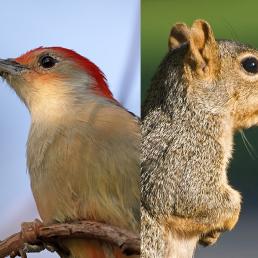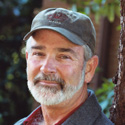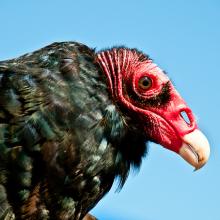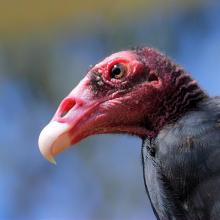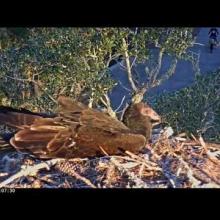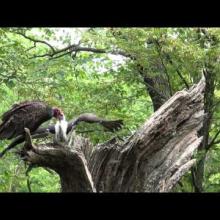

Join BirdNote tomorrow, November 30th!
Illustrator David Sibley and actor H. Jon Benjamin will face off in the bird illustration battle of the century during BirdNote's Year-end Celebration and Auction!
Do vultures detect carrion by sight or by smell? The lightbulb moment came to ornithologist Kenneth Stager when a Union Oil employee told him of vultures congregating at the spots along pipelines where gas leaks were occurring. Why would they do that? Because a key ingredient in the odor of carrion is ethyl mercaptan — the same substance companies add to odorless natural gas in their pipelines, so they could smell if there was a leak. So now we know that vultures can spot carrion by either sight or smell.
BirdNote®
Turkey Vultures and Gas Pipelines
Written by Bob Sundstrom
This is BirdNote.
In the late 1950s, scientist and ornithologist Kenneth Stager set out to answer, once and for all, a question that has been argued over for decades. Do vultures detect carrion by sight or by smell?
The story goes that his lightbulb moment came when a Union Oil employee told him of vultures congregating at the spots along pipelines where gas leaks were occurring. Why would they do that? Because a key ingredient in the odor of carrion is ethyl mercaptan. (mur-KAP-tan) The same substance companies added to odorless natural gas in their pipelines, so they could smell if there was a leak. With just about the keenest sense of smell in nature, Turkey Vultures can detect this odor in the air at even a few parts per trillion.
So Stager rigged up a mercaptan-emitting machine, took it into the field, and recorded his results. Definitively, he proved that vultures can find their prey because of its smell.
Today, there are more sophisticated ways to track pipeline leaks. But who knows? … Now and again, a watchful worker may just cast an eye upward, on the lookout for ominous silhouettes slowly circling against the blue sky.
Today's show brought to you by the Bobolink Foundation. I'm Mary McCann.
###
Bird sounds provided by The Macaulay Library of Natural Sounds at the Cornell Lab of Ornithology, Ithaca, New York. Desert ambience: '002 Wind Mod Soft' and '132 Desert Morning Bird Chorus' Nature SFX recorded by Gordon Hempton of QuietPlanet.com
BirdNote’s theme music was composed and played by Nancy Rumbel and John Kessler.
Producer: John Kessler
Executive Producer: Dominic Black
© 2015 Tune In to Nature.org June 2017/2019 / January 2023 Narrator: Mary McCann
ID# TUVU-05-2015-06-10TUVU-05
